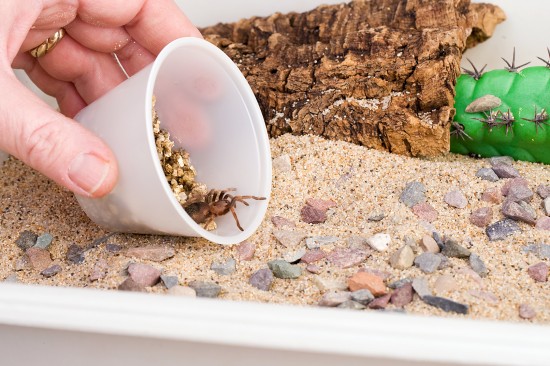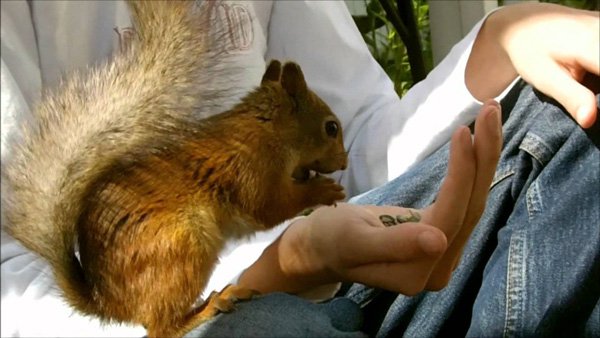

One of the most rewarding aspects of tarantula ownership is being able to successfully breed from your spider, and generally speaking it is not too difficult to find a specialist pet shop or tarantula supplier who might consider buying your spiderlings from you to sell on. Captive breeding is an important service to the worldwide wellbeing of tarantulas, to avoid further wild-caught specimens being taken out of their natural habitat to supply the pet trade.
However, breeding tarantulas is not an endeavour that should ever be undertaken lightly or on a whim, and is certainly not as simple as putting a male and a female spider into the same tank and letting them do what comes naturally. Unless both the spiders in question and the situation is right, what “comes naturally” will generally be a lot of fighting that will be detrimental to both spiders, and generally lead to the death of the would-be father without any spiderlings produced at the end of it!
If you are considering breeding from your tarantula, before you even get as far as looking at how to go about this and the logistics of what is involved, read this article on considerations to bear in mind, and how to reach a sensible decision on whether or not to breed your spiders.
An important consideration to bear in mind when deciding whether or not to breed your tarantulas is the species of tarantula you keep. This will dictate how easy or hard it is to achieve successful breeding, what the demand is likely to be for the subsequent offspring if breeding is successful, and how challenging it will be to manage the breeding process safely.
Some of the most popular tarantulas commonly kept in the UK are the Chilean rose, Mexican redknee, and other hardy, docile beginner breeds. This means that demand for tarantulas of these types is likely to be higher than for most other species, but also that there are likely to be many more people breeding them to meet the demands of the pet trade. It is important to establish whether or not there will be demand for the species you intend to breed before going forwards. Less common tarantulas such as baboon tarantulas are often in demand due to the fact that they are rather more exotic and there are less breeders producing them, but they are also aggressive and challenging to keep, so the potential market for them will be much smaller.
Many tarantula enthusiasts keep more than one species of tarantula, and it may well cross your mind to see if you can also successfully crossbreed two different types of spiders. However, this is not a good idea! The crossbreeding of different species of spiders to produce hybrids is very much frowned upon in the arachnid-keeping world, and you will almost certainly be unable to find homes for the results of such a mating. Crossbred tarantulas often come accompanied by a range of problems and issues including potential sterility, and not enough is known about any combination of two breeds that form a hybrid to be able to adequately predict its care needs, behaviour or temperament.
A big question of course, is what you will do with the offspring of any successful mating. Tarantulas produce between 50 and 2,000 viable spiderlings eggs from every successful breeding, and while a significant number of these spiderlings will not live to maturity, you will still find yourself with a heck of a lot of fast-growing baby spiders on your hands. All of these will require housing, feeding and care, and while baby spiders can be kept together during the initial stages of their life, they will require separating from each other once they start to eat live food and approach their first juvenile moult, to avoid cannibalism between the offspring!
You may well find that an exotic pets retailer will buy your spiderlings from you once they reach their first moult from nymphs (newborn spiders that are very small and white or transparent in appearance) into spiderlings, but you should source an outlet for the offspring before you breed, to make sure.
You may wish to sell your spiderlings yourself privately, although this can be hit or miss in terms of finding enough potential buyers for your tarantulas; meanwhile you are left with a significant amount of fast-growing juveniles and running out of space, equipment, time and food to look after them with. You will quite possibly wish to keep a couple of the spiderlings from your first successful breeding yourself, but make sure that you can accommodate for all of your potential offspring until they are homed as well!
The vast majority of pet tarantulas kept in the UK are captive-bred, and with common breeds such as the Chilean Rose or Mexican redknee, it would be considered very uncommon to see a wild-caught specimen in the UK these days. Some more unusual specimens may have been caught from the wild however, and the beginner or first-time breeder should avoid trying to breed wild-caught tarantulas. Wild-caught specimens are likely to prove more challenging to breed from, harder to care for when breeding and also, may be accompanied by parasites from the wild that can easily be passed onto their offspring and potentially threaten the viability of their life.
Captive breeding is an important part of ensuring the ongoing viability of any given species of tarantula kept as a pet, and reduces the amount of impact on the natural habitat and wild spiders from which our domestic tarantulas originate. Captive breeding from first generation wild-caught specimens of unusual tarantulas is a valuable endeavour, but best left to the professionals!
For the first-time potential tarantula breeder, it can be incredibly helpful to have an expert to hand to answer any questions or help you to trouble-shoot any potential problems. There are many online forums where tarantula enthusiasts gather to discuss their hobby, and you may find that exotic pet retailers or specialist arachnid breeders will also be able to help and advise you, particularly if they might be interested in buying your stock of spiderlings.
 Does your dog do its exercise?
Does your dog do its exercise?
Pooches can be
Does your dog do its exercise?
Does your dog do its exercise?
Pooches can be
 Floor Time For Your Guinea Pig
Floor Time For Yo
Floor Time For Your Guinea Pig
Floor Time For Yo
 Old English Sheepdog Hereditary Health And Health Testing
Old English Sheep
Old English Sheepdog Hereditary Health And Health Testing
Old English Sheep
 Ten Really Interesting Facts About Cats
Ten Really Intere
Ten Really Interesting Facts About Cats
Ten Really Intere
 Choosing A Good Chinchilla Breeder To Buy Your New Pet From
Choosing A Good C
Choosing A Good Chinchilla Breeder To Buy Your New Pet From
Choosing A Good C
Copyright © 2005-2016 Pet Information All Rights Reserved
Contact us: www162date@outlook.com